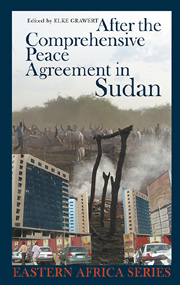Book contents
- Frontmatter
- Contents
- List of Tables & Figures
- Editor's Preface
- Notes on Contributors
- List of Acronyms
- Map of Sudan
- 1 Introduction
- I Implementation & Potential of the CPA
- II Challenges Facing Post-war Societies in Sudan
- III The CPA in its Sub-regional Context
- IV Beyond the CPA
- 15 Theoretical Outcomes
- Index
- EASTERN AFRICAN STUDIES
15 - Theoretical Outcomes
from IV - Beyond the CPA
Published online by Cambridge University Press: 05 April 2013
- Frontmatter
- Contents
- List of Tables & Figures
- Editor's Preface
- Notes on Contributors
- List of Acronyms
- Map of Sudan
- 1 Introduction
- I Implementation & Potential of the CPA
- II Challenges Facing Post-war Societies in Sudan
- III The CPA in its Sub-regional Context
- IV Beyond the CPA
- 15 Theoretical Outcomes
- Index
- EASTERN AFRICAN STUDIES
Summary
The research compiled in this book contains various challenging attempts to put the CPA and its repercussions in a theoretical perspective. Since wealth and power sharing is one of the formulas that are being applied in one way or another in different conflict-ridden societies, it seems worthwhile to elaborate in some depth the conceptual ideas that have emerged.
According to the theoretical issues raised, this concluding chapter is divided into three sections. The first discusses the potential of wealth and power sharing agreements to establish public institutions through which peaceful negotiations can become the main means of conflict resolution. It focuses on three key aspects of democratisation: extended political participation, fair representation of relevant social groups, and devolution of power. The second deals with the different social divides that have to be tackled by the CPA. The focus is on the construction of identities during and after the civil war. This section is an attempt to identify the factors which have led to new conflicts after the CPA, to assess the potential for further divides, and to consider approaches to bridge these divides. The last extracts theoretical concepts from the analysis of the sub-regional repercussions of the CPA. It deals with possible approaches to extend the CPA in order to make it more comprehensive. It also conceptualises state-society relations that transcend national borders and assesses the requirements for institutions that may have the capability to establish sub-regional peace.
- Type
- Chapter
- Information
- After the Comprehensive Peace Agreement in Sudan , pp. 265 - 284Publisher: Boydell & BrewerPrint publication year: 2010

